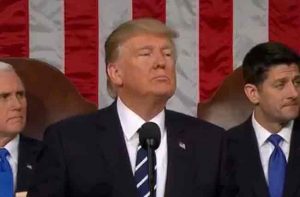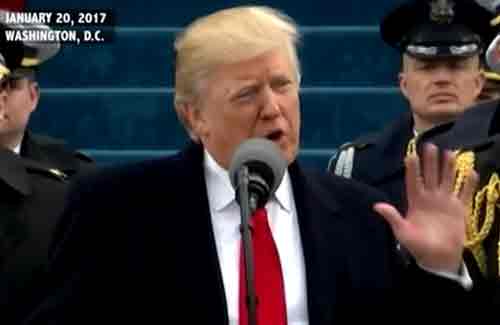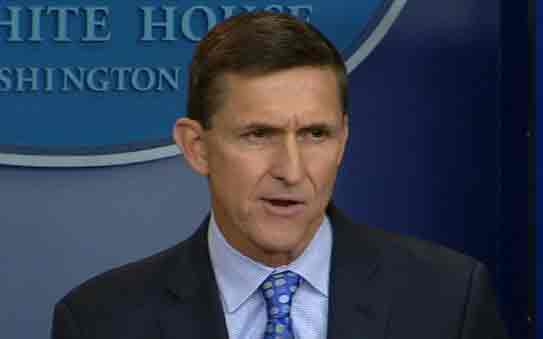
Making his first address before the U.S. Congress, President Donald Trump projected a brighter luster Tuesday night than he did in the speech at his inauguration six weeks ago.
“The time for small thinking is over,” he declared. “The time for trivial fights is behind us.”
But there was reference to fighting – especially the battle against what the president called “radical Islamic terrorism.” That is a phrase, according to several news organizations, that National Security Adviser Lt. Gen. H.R. McMaster and some members of his staff advised Trump to stop using.
McMaster reportedly told his staff last week he preferred the term “radical Islamist terrorism” which is used to describe fundamentalist supporters of Islam-based government and society, rather than an implied blanket covering all Muslims.
Specifically mentioning the so-called Islamic State group, Trump said the United States “will work with our allies, including our friends and allies in the Muslim world to extinguish this vile enemy from our planet.”
Infrastructure, Healthcare
The president called for spending $1 trillion to rebuild America’s infrastructure and said he will ask Congress to approve one of the biggest-ever boosts in the budget for the military. He also promised tax cuts for business and the middle class but gave no details about big budgets cuts elsewhere that would be needed to pay for all of this.
Some of those cuts are certain to be deep and controversial.[xyz-ihs snippet=”adsense-body-ad”]Amid reports that the State Department would see its budget slashed by as much as 38 percent, the Senate Majority Leader, Mitch McConnell, told reporters before the speech he would not support such cuts and they will not gain legislative approval.
The Republican also said his party is not yet in agreement on a plan to replace the Affordable Care Act, the federal health insurance popularly known as Obamacare.
During his address Trump asserted that “Obamacare is collapsing – and we must act decisively to protect all Americans. … So I am calling on all Democrats and Republicans in Congress to work with us to save Americans from this imploding Obamacare disaster.”
Democratic response
In the Democratic Party’s response, Steve Beshear, the former governor of Kentucky, speaking from a diner in his state, accused the president of not holding up his promise to help people “struggling to make ends meet.”
While members of Trump’s Republican party were more enthusiastic than Democrats, members of both parties welcomed the more conciliatory and presidential tone of the speech compared to other recent remarks by the president.
Republican Rep. Joe Barton thought Trump put forth “a vision for a resurgent America,” while giving hope to both working class Americans and conservatives who want a smaller government.
“Like most presidents he was strong on the goodies, but a little weak on how to pay for it,” he said.
While voicing skepticism, a number of the Democrats expressed a willingness to work with the president on shared priorities. One area that has been identified as a possible track for cooperation is spending to repair the nation’s infrastructure.
“He did talk about some good things where I hope we can find some common ground – infrastructure, family leave, child care, building up our military to make sure that it’s strong,” said Rep. Joaquin Castro, a Democrat from Texas.
Short on specifics
Some analysts found the president’s speech short on specifics in terms of policy.
“President Trump’s Administration has demonstrated no coherent foreign policy whatsoever. Tonight’s speech did nothing to address that very serious problem,” said Michael Breen, president of the Truman National Security Project.
WATCH: President Trump Delivers First Congressional Address
The president put the blame on the past saying his administration has “inherited a series of tragic foreign policy disasters.”
Trump expressed support for NATO and again called on partners to meet their “fair share.”
He said following “very strong and frank discussions,” NATO members are stepping up their contributions.”I can tell you the money is pouring in,” Trump said, though he did not elaborate.
Navy SEAL honored
The most emotional moment of the address, which drew applause from both Democrats and Republicans, occurred when Trump recognized Carryn Owens, the widow of a member of the Navy SEAL team who was killed during a raid in Yemen that the president authorized.
White House protest
Prior to the president’s address, a couple of hundred protesters gathered in the rain in Lafayette Park, across from the White House.
“I feel like priorities are in the wrong places, as far as where money is being spent or where money is being pulled out of,” Amos Nasongo, an immigrant from Kenya living in Boston told VOA. “A lot of the Cabinet picks are a little disturbing to me.”
There was a protest of sorts inside the Congress with a number of female lawmakers dressed in white, the color of the late 19th/early 20th century suffragettes, as a statement of women’s rights.
Immigration, a common theme during Trump’s presidential campaign, was also in his remarks but with a new twist: The president proposing a merit-based system for immigration like those used in some other countries.
He also returned to his pledge to build “a great, great wall along our southern border,” promising construction will begin soon. But notably absent was his oft-repeated vow to make Mexico pay for it.
Every year when presidents appear before Congress for a joint address – known as the State of the Union – except when it’s the first such speech of a new president they utter a cornucopia of promises. But Trump may have been the first U.S. president to promise everything.
At one point he said “everything that is broken in our country can be fixed. Every problem can be solved.”
Elizabeth Cherneff contributed to this story.
Source: VOA [xyz-ihs snippet=”Adsense-responsive”]








